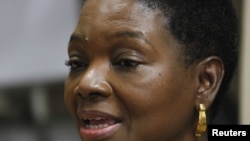BANGKOK —
The United Nations Under-Secretary-General for Humanitarian Affairs and Emergency Relief Coordinator,Valerie Amos, is meeting with Burma's President Thein Sein after visiting displaced peoples camps in Rakhine and Kachin states. Amos is expected to discuss the sensitive issue of citizenship for the Rohingya, a persecuted Muslim minority, as well as improving conditions and aid access in the camps.
Amos visited Kachin state, where fighting between the army and ethnic rebels along the China border has displaced tens of thousands of people. She also traveled to western Rakhine state, where communal fighting this year between Rakhine Buddhists and Muslim minorities left close to 200 dead and 115,000 displaced.
The worst affected were the Rohingya, a stateless Muslim minority considered one of the world's most persecuted.
U.N. officials say Amos will discuss the issue of citizenship for the Rohingya with President Thein Sein.
Stewart Davies, a spokesman for the U.N.'s Office of Coordinator of Humanitarian Affairs in Burma, notes the president has said Burma needs to address the issue of citizenship in a positive and inclusive manner.
"I think for her she would definitely be interested in advocating towards that as well and potentially even looking towards well, what are the practical steps and what are the timelines, what is the timeline in this regard," Davies says.
Citizenship for the Rohingya is sensitive in Burma, where most people and the government prefer to call them Bengalis. The term reflects the view that many consider them illegal migrants from Bangladesh -- despite the fact that many have lived in Burma for generations.
The vast majority of the displaced in camps in Rakhine state are Rohingya. But because of continuing tensions, humanitarian aid workers have received threats and intimidation for trying to help them.
The U.N. OCHA quoted Amos as saying the level of assistance varies significantly by camp and that security threats are a major challenge. She also said camp conditions are overcrowded with substandard shelters and sanitation.
Davies says Amos will push President Thein Sein for better access as well as improved conditions in the camps.
"Most in need is shelter, food, non-food items like household goods, tarpaulins, those sorts of things, and health care services, water, sanitation and hygiene facilities," he explains. "But, all of them are desperately needed across the board."
Phil Robertson, deputy director for Asia at Human Rights Watch, says the U.N. humanitarian chief's visit and comments underscore the problems in Rakhine state, also known as Arakan.
"It's a welcome recognition of the dire situation that are facing persons in these internally displaced persons camps in Arakan State," Robertson says. "It's a reflection of reality. And, it is an indictment of the policy of de facto segregation that the government of Burma appears to be pushing."
Robertson says the government has to find some way for the two groups to live together if they want to have a long-term solution to the conflict.
Amos visited Kachin state, where fighting between the army and ethnic rebels along the China border has displaced tens of thousands of people. She also traveled to western Rakhine state, where communal fighting this year between Rakhine Buddhists and Muslim minorities left close to 200 dead and 115,000 displaced.
The worst affected were the Rohingya, a stateless Muslim minority considered one of the world's most persecuted.
U.N. officials say Amos will discuss the issue of citizenship for the Rohingya with President Thein Sein.
Stewart Davies, a spokesman for the U.N.'s Office of Coordinator of Humanitarian Affairs in Burma, notes the president has said Burma needs to address the issue of citizenship in a positive and inclusive manner.
"I think for her she would definitely be interested in advocating towards that as well and potentially even looking towards well, what are the practical steps and what are the timelines, what is the timeline in this regard," Davies says.
Citizenship for the Rohingya is sensitive in Burma, where most people and the government prefer to call them Bengalis. The term reflects the view that many consider them illegal migrants from Bangladesh -- despite the fact that many have lived in Burma for generations.
The vast majority of the displaced in camps in Rakhine state are Rohingya. But because of continuing tensions, humanitarian aid workers have received threats and intimidation for trying to help them.
The U.N. OCHA quoted Amos as saying the level of assistance varies significantly by camp and that security threats are a major challenge. She also said camp conditions are overcrowded with substandard shelters and sanitation.
Davies says Amos will push President Thein Sein for better access as well as improved conditions in the camps.
"Most in need is shelter, food, non-food items like household goods, tarpaulins, those sorts of things, and health care services, water, sanitation and hygiene facilities," he explains. "But, all of them are desperately needed across the board."
Phil Robertson, deputy director for Asia at Human Rights Watch, says the U.N. humanitarian chief's visit and comments underscore the problems in Rakhine state, also known as Arakan.
"It's a welcome recognition of the dire situation that are facing persons in these internally displaced persons camps in Arakan State," Robertson says. "It's a reflection of reality. And, it is an indictment of the policy of de facto segregation that the government of Burma appears to be pushing."
Robertson says the government has to find some way for the two groups to live together if they want to have a long-term solution to the conflict.





